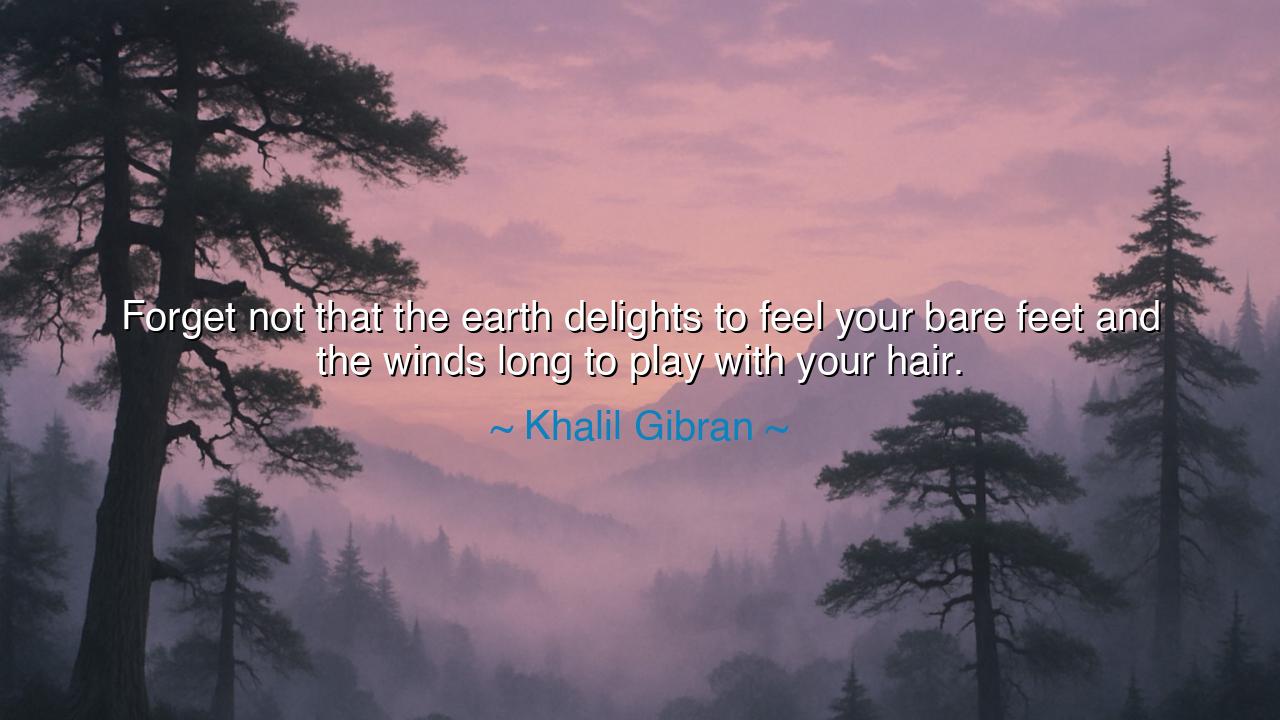
Forget not that the earth delights to feel your bare feet and
Forget not that the earth delights to feel your bare feet and the winds long to play with your hair.






Hear, O children of the earth, the tender words of Khalil Gibran, prophet of beauty and poet of the soul: “Forget not that the earth delights to feel your bare feet and the winds long to play with your hair.” In this gentle command lies a truth older than mountains—that man is not a stranger upon this world, but a child of it. The earth is not mere ground beneath us, but a living companion, rejoicing in our touch. The winds are not lifeless air, but playful spirits that yearn to dance with us. Gibran calls us to remembrance: that we belong not only to cities and machines, but to the soil and the sky.
The origin of these words lies in Gibran’s vision of unity between the human spirit and the natural world. Born among the mountains of Lebanon and later living in the bustling world of the West, he saw the danger of forgetting the simplicity of the earth. His writings, steeped in mysticism and love, reminded his readers that creation itself yearns for communion with mankind. In the bare feet upon the soil, he saw innocence restored. In the winds playing with hair, he saw freedom, childlike joy, and harmony with the cosmos.
Consider the story of St. Francis of Assisi, who walked barefoot among the fields and spoke of Brother Sun, Sister Moon, and Mother Earth. To him, the natural world was not dead matter, but family. He sang with the birds and blessed the rivers, believing that creation itself praised God in its being. His life illustrates Gibran’s words: the earth delights when man walks humbly upon it, not as master but as kin; the winds rejoice when man abandons pride and receives their play. In such moments, man is restored to his true place.
History also offers us a warning in its opposite. When empires have forgotten the earth, plundering it for gain without reverence, ruin has followed. The dust that once fed crops became deserts, the forests stripped bare, the waters poisoned. In such estrangement, man loses not only nature but himself. Gibran’s words are a shield against this forgetfulness. He whispers: “Forget not,” for he knew how easily men in their striving overlook the gifts of soil and sky.
The meaning, then, is both mystical and practical. To walk with bare feet is to shed the armor of pride and reconnect with humility. To feel the wind in your hair is to release fear and allow joy to touch you. These are not only images of beauty; they are disciplines of the spirit. They remind us that man is strongest when he remembers his smallness, most noble when he honors the simplest gifts. The earth and the winds are not silent—they are companions, teachers, and mirrors of the eternal.
The lesson for you, listener, is this: return often to the simplicity of nature. Do not let life in walls and wires make you forget the soil beneath you. Walk upon the grass barefoot, even if only for a moment. Let the wind move through your hair and remember that you are alive, that life is more than labor, more than ambition—it is communion. In such moments, you will find peace that no wealth can buy, strength that no army can give, joy that no empire can steal.
Practical actions are within reach. Go into the woods or the fields. Remove your shoes and stand upon the earth, feeling its coolness and its pulse. Lift your face to the sky and let the wind touch you without resistance. Teach children not only numbers and machines, but the joy of soil and sky. Plant a garden, bless the rain, greet the sunrise. These small acts are great acts, for they restore harmony between man and creation.
So remember the gentle command of Gibran: “Forget not that the earth delights to feel your bare feet and the winds long to play with your hair.” Do not live as one exiled from the world, but as one embraced by it. Walk humbly, live joyfully, breathe deeply, and know that creation itself rejoices in your presence. For in that communion, you find your truest self—not apart from nature, but a beloved part of it.






AAdministratorAdministrator
Welcome, honored guests. Please leave a comment, we will respond soon